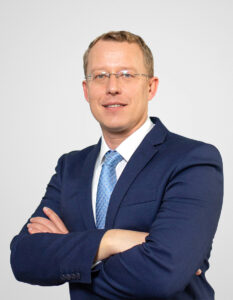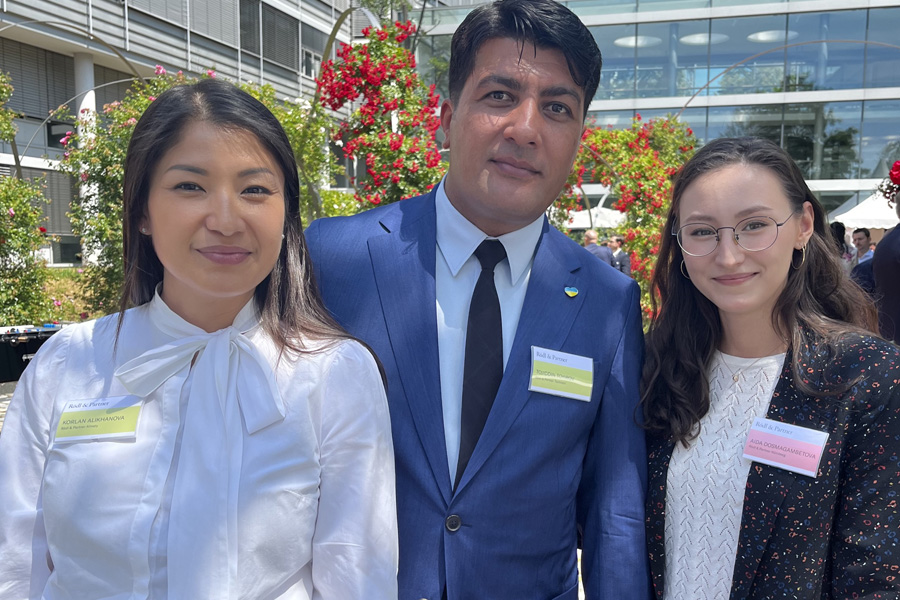Patience and planning are keys to success in Central Asia

Almaty. Kuvituskuva:
The specialists of Rödl & Partner know how the long history of trade shapes the way of doing business in the region.
Text Patrik Saarto Pictures Rödl & Partner
More than 100 offices in around 50 countries, over 5 500 specialists in law, taxation, accounting, and business. Having started from servicing the needs of family owned German Mittelstand, the Rödl & Partner has grown into a worldwide partner in international business, never forgetting its roots and expertise in working with middle sized family businesses.

Michael Quiring is the head of Rödl & Partner offices in Almaty and Tashkent.
In Central Asia Rödl & Partner has two offices, one in Almaty, Kazakhstan and another in Tashkent, Uzbekistan. But the offices work together as one team, says the head of both offices Michael Quiring.
– You have one person who is responsible for the whole request, no matter where we are sitting, he tells.
Rödl & Partner is working in Kazakhstan since 2009 and entered Uzbekistan in 2019 among the first ones as the ongoing reforms started to open the country’s doors for international business. In Almaty office there are 25 specialists, and in Tashkent eight, mostly accountants and attorneys at law.
– Our job is to explain how to begin, how to do business, how local rules and regulations may impact business ideas and approach. We know the local requirements, and on the other hand, the mentality of the European business, Quiring says.
“We know the local requirements and the mentality of the European business.”
Other countries in the region are not outside of the company’s scope. For requests concerning Kyrgyzstan, Tajikistan or Turkmenistan, Rödl & Partner has trustful, reliable partners in these countries.
The roots of Rödl & Partner are still visible. More than 60 per cent of clients in Central Asia are middle sized, German based companies. But the core expertise is in working with family owned companies, no matter what is their country of origin.
By Michael Quiring, the advantage of such kind of a company is in the simple decision making process.
– We are also a family owned company. We understand how the companies are thinking, how their risk evaluation is happening, how the decisions have to be prepared, Quiring says.

Some of the specialists of Rödl & Partner Legal Team.
European companies are entering Central Asian markets
Changes in the economy affect the tasks Rödl & Partner get from the clients. For example, a slowdown in 2015 in Kazakhstan reduced investments and turned the focus of work in liquidation processes.
Usually requests from clients are concerning standard market entries. Rödl & Partner advice the clients with currency issues, financing, registration, labour agreements, accounting and everything needed in starting a business.
After the Russian war of aggression started in Ukraine, the amount of market entry requests from European companies have increased.
– There are no other alternatives in the region. A lot of companies are entering the market. It could be LLC, branch offices or representative offices, it’s the standard approach, Michael Quiring describes.
“There are no other alternatives in the region.”
The changes in the economy never come alone. Recently the costs have increased, for example rental fees, but obviously the most notable changes are related to sanctions. Newspapers often write about violation of sanctions, but everyday business is about ensuring everything goes according to the rules.
– We have our sanctions task force, which is dealing with sanctions compliance. It’s a new product, which starts with the analyses of the potential customer and ends with some webinars and seminars for the local Kazakhstani or Uzbek companies, where we explain to the local management, why we should be aware, how to control and why is it important, Quiring tells about the compliance process.
Long traditions of trade
Michael Quiring has ideal experience for building bridges between European and Central Asian businesses. He has born in Almaty and studied law in Germany. At Rödl & Partner he has worked for over 10 years.
The deep and long experience from both regions has taught what are the differences and peculiarities in business cultures. As German or Finnish companies tend to go straight to the point, keep everything simple and count every minute, in Central Asia, especially along the historical Silk Road, people are used to negotiate a lot and for long. It may take days on a business trip or several dinners to really launch the negotiations.
And after the agreement is signed, some changes may be needed afterwards. A European company must be ready to renegotiate the conditions one more time.
– The most important skill is to be patient. If you don’t negotiate and you don’t understand it, you will fail. You really must negotiate, be patient with it, then you will be successful, Quiring gives some advice for European companies.
“The most important skill is to be patient.”
Another advice is to plan carefully before action. Quiring says that European companies are good at planning, they think about even unpredictable situations, which keeps their business stable. The rise of costs or new sanctions have not caused any outflow of European companies from the Central Asian market. But planning and forecasting are vital. A comprehensive business plan lets the company do business relaxed, if, for example, taxation or legislation suddenly changes.
It’s good to discuss with consultants step by step, what it needs to get goods from Finland to Kazakhstan or Uzbekistan, to understand the whole business process. There are important details, like the official stamp for customs authorities, which are needed to take in account. There are useful, modern tools, like the high level of digitalization of the taxation system, public services and signing documents.

Some of the specialists of Rödl & Partner Legal Team.
The first ones have the biggest advantage
Perspectives in Central Asia are promising. Michael Quiring reminds, that together Kazakhstan and Uzbekistan form an emerging market of 50 million people, with growing population. Demand for agricultural sector is increasing. There is growing demand for solutions concerning climate change and water management.
The countries are rich in natural resources, so the mining sector needs solutions and machinery. There is need for pharmaceutical equipment in the countries.
– But there can be also some hidden business areas, where you would say the market is large enough to make the first move. Then you have the first move advantage, and you can do a lot, even with a small product, Quiring concludes.
Rödl & Partner
- Founded in 1977
- Personnel more than 5 500
- More than 100 own offices in around 50 countries
- Global turnover 588,6 million Euros in 2022
